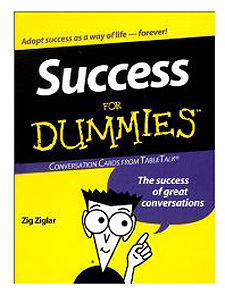 Every summer session I teach a module to the incoming students of the University of Florida Master of Science in Real Estate program. Just like this blog, I title my class Personal Leadership, focusing on “soft skills.” I tell the students that while the hard skills they will learn in their other classes at UF, such as industry knowledge and analytical ability, are an absolute must, at a certain level of achievement and advancement hard skills are just table stakes. Everyone has them, everyone has earned their stripes, we all know our stuff backwards and forwards. Those who don’t have dropped out a long while back.
Every summer session I teach a module to the incoming students of the University of Florida Master of Science in Real Estate program. Just like this blog, I title my class Personal Leadership, focusing on “soft skills.” I tell the students that while the hard skills they will learn in their other classes at UF, such as industry knowledge and analytical ability, are an absolute must, at a certain level of achievement and advancement hard skills are just table stakes. Everyone has them, everyone has earned their stripes, we all know our stuff backwards and forwards. Those who don’t have dropped out a long while back.
At high levels of performance and accomplishment, what begins to differentiate people is their soft skills: their emotional intelligence, their understanding of human motivation, their communication skills (both with others and with themselves), their ability to negotiate and persuade, their ability to keep calm under stress, their ability to make decisions amid vast uncertainty (all the easy decisions will be made at lower pay grades!), their awareness of human psychology, and common errors of observation we tend to make (see “Sway,” “Predictably Irrational,” and “Drunkard’s Walk”).
One student assignment is to read “The 7 Habits of Highly Effective People.” I ask that they write a short essay on their thoughts on each habit and how it might apply to them.
At the end of the semester I ask for feedback on what I can do better for the next class. I love real estate and I talk often about the deals that I’m working on and the details of the deals I’ve done. I try to pull back the curtain and show them what goes on backstage, the nitty-gritty stuff that often gets glossed over but is vital to understanding how to actually work a deal and get it closed.
I receive a lot of positive feed back on “7 Habits” and students enjoy the real estate show-and-tell portion of my class. BUT the #1 topic I get good feed back on is…(drum roll please): the class on goal setting.
I take a three-hour class to go through a goal-setting session. We start out with the six roles in life:
- Family/Personal
- Career/Financial
- Physical/Health
- Spiritual/Creative
- Education/Mental
- Social/Community
I then take them through a series of questions for each role designed to spark thoughts around their goals for each. I ask them to list each role at the top of a separate piece of paper and write a minimum of 3 to 5 goals (many of the students have more) for each role.
We then work on giving each goal a timeframe within which they want to it to be accomplished, because a goal without a deadline is merely a daydream. Many goals have multiple timeframes, certain levels or way posts we wish to achieve by various times in our lives.
I then ask them to pick a goal in each role and write out an action plan to achieve it with specific, concrete steps to be taken TOMORROW, the end of the week, end of the month, end of the quarter, end of the year, and so on, until the goal is reached. I ask them to lay out specific interim accountability checkpoints and suggest they pick someone to be their coach, cheerleader, and accountability guardian and steward.
Over the years I have received more positive feedback on this one goal-setting class than anything else. Former students have approached me years later to say it was life changing, life focusing, life invigorating.
So, isn’t it about time you had a clear, written plan for your life, for every major role you have? And an action plan for each goal? You will be amazed at the results. Your life is worth the effort!
Closing quotes:
- “A goal properly set is halfway reached.” – Abraham Lincoln
- “You’ll fail at a 100% of the goals you don’t set.” – Mark Victor Hansen
- “In the long run men hit only what they aim at.” – Henry David Thoreau
—- Video Excerpt from Personal Leadership Class —-


0 Comments